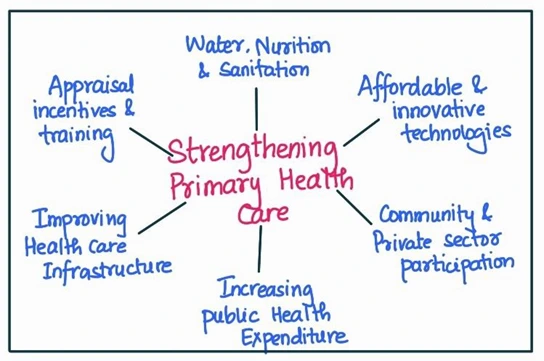Approach:
- Introduction: Briefly introduce the concept of primary health care as a moral imperative of a welfare state.
- Body:
- Analyse its role as a necessary precondition for sustainable development.
- You can start by mentioning case studies of TN, Kerala , Delhi etc.
- Conclusion: Write a relevant conclusion.
|
Introduction:
Primary health care is a fundamental aspect of a welfare state and plays a crucial role in promoting sustainable development. As a moral imperative, it ensures that all citizens have access to essential health services, while also serving as a foundation for building a healthy and productive society.
Body:
The significance of primary health care as a prerequisite for sustainable development can be demonstrated through a few examples from India:
- Health as a human right: As part of a welfare state, primary health care is a moral imperative, ensuring that every individual has access to basic health services. This aligns with the concept of health as a human right, which emphasizes that all people should have the opportunity to attain the highest possible level of health.
- Kerala’s primary health care system demonstrates the operationalization of health as a human right. With a strong network of health centers and community health workers, it ensures access to basic health services for all, contributing to Kerala’s impressive health indicators.
- Equitable access to health services: A strong primary health care system ensures equitable access to health services for all citizens, regardless of their socio-economic status.
- Tamil Nadu ensures equitable health service access through an extensive network of primary health centers and sub-centers, even in remote areas. The “Amma Clinic” initiative provides free essential health services, emphasizing equity in access.
- Preventive care and cost-effectiveness: By focusing on cost-effective preventive measures, primary health care contributes to the efficient allocation of resources and fosters sustainable development.
- Delhi’s Mohalla Clinics focus on preventive care and cost-effectiveness in primary health care. They provide free services, including preventive health care, diagnostics, and basic drugs, helping prevent disease escalation, reducing tertiary care burden, and enhancing health system cost-effectiveness.
- Improved health outcomes: Access to primary health care services is directly linked to better health outcomes, such as reduced infant mortality, increased life expectancy, and lower disease prevalence.
- Economic productivity: Primary health care, by ensuring access to essential health services, helps create a healthy and productive workforce, which is critical for sustainable development.
- Social cohesion and stability: Primary health care promotes social cohesion and stability by addressing the health needs of all citizens, including vulnerable and marginalized populations.

Conclusion:
By ensuring equitable access to health services, promoting preventive care, improving health outcomes, and fostering economic productivity and social cohesion, primary health care lays the foundation for a healthy, inclusive, and prosperous society that can sustainably develop and thrive.
